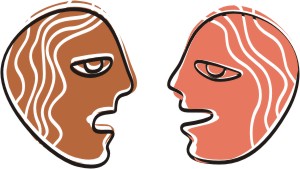|
Postscript
To Tell or Not To Tell
AASHA MEHREEN AMIN
 One of the first rules of living in society is keeping up appearances. It means smiling sweetly at your boss when he asks how you are, even though you have just banged your head into a glass door and can actually see butterflies in psychedelic colour and your forehead is swelling into a potato. It means telling your anxious mother that your exam went quite well, knowing fully well that the only marks you will get will be for turning up, if that counts. It means saying brightly how great your job, marriage, children, in-laws, generally your life, is, when the nosy auntie from next door asks you, looking closely at your facial expressions to detect anything amiss. One of the first rules of living in society is keeping up appearances. It means smiling sweetly at your boss when he asks how you are, even though you have just banged your head into a glass door and can actually see butterflies in psychedelic colour and your forehead is swelling into a potato. It means telling your anxious mother that your exam went quite well, knowing fully well that the only marks you will get will be for turning up, if that counts. It means saying brightly how great your job, marriage, children, in-laws, generally your life, is, when the nosy auntie from next door asks you, looking closely at your facial expressions to detect anything amiss.
This is the unstated paradigm of civil behaviour when in public and when only a certain amount of superficial exchange is required. It's like Americans who pass each other in the corridor asking: “Hey how are you? Good? Good. Me? Good thanks.” Sometimes this is reduced to just: “Hi how are you?” Before you can unwisely respond with: “Well actually, I'm not that good, I just found out I need to go to rehab for my addiction to cough syrup and my best friend has just run away with my husband, my five-year-old thought it was ok to microwave the cat…” Of course you can try, but chances are the person has swept past you like a gust of wind even before you could open your mouth. The idea is to acknowledge the other person's existence, nothing more, nothing less.
In Bangladeshi society, it is expected that people acknowledge each other with a salaam or a “Kemon Achhen?” followed by enquiring after the spouse and children. If you are in a hurry you will say the equivalent of “Oh good thanks and you?” praying the answer will be equally brief. But here's the catch. Many Bangladeshis actually want to know everything about people, the real stuff, every little pain and agony that is making the other person a nervous wreck inside. Many times what would have been a few seconds encounter will have turned into a full-blown half hour confiding spree at the foot of the stairs of the office building.
This is all very well when two equally curious, information and entertainment-starved people meet and discuss the harir khobor (roughly translated to 'home truths') of each other and of course of people they barely know. The problem occurs when one of the two is the sort who values his privacy more than his life's savings and the other is the garrulous, gregarious colleague who thinks everybody's business is his to keep and disseminate. The conversation becomes rather stilted and painful. The more clipped and vague the answers of one becomes, the more the appetite of the Nosey Parker is whetted and he will go on asking, relentlessly until there is a total breakdown in the relationship when the exasperated 'answerer' says: “Tate apnar ki?” (What's it to you?). Needless to say this remotely- possible friendship has effectively ended.
Yet this is rather the exception than the rule. In the villages sometimes 'adda' or plain chitchat is the main form of entertainment before the sun goes down and when there is no electricity whatsoever, to watch the scintillating BTV shows. This culture of exchanging every crummy detail of each other's lives and that of others has seeped into urban areas long before anyone ever noticed the time whiled away in mindless chatter. Today, you may be talking about the intricacies of your intestines to a total stranger while waiting at the doctor's and she hers with no inhibitions at all. A backbiting colleague is hampering your professional peace of mind? Just talk it out with the part-time maid and she may give you some sound advice.
Like most parts of the globe, we too tend to automatically say 'bhalo' (good) when someone asks us about our well-being. But in those moments when we actually let down our guard and take it to the next level by telling people how we really are, chances are that they will stop what they are doing and listen to you, genuinely interested in your predicament. One can see the benefits of such curiosity.
Copyright
(R) thedailystar.net 2010
|

